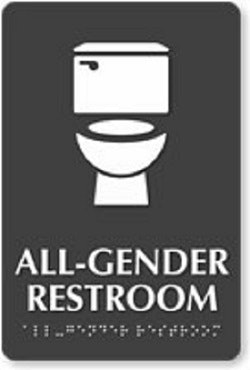HOUSTON — ACPA is formally protesting bathroom-access legislation introduced in the state last year, citing potentially negative impact on college students and effects on attendance at the annual convention that began last week.
Although the so-called “bathroom bill” introduced in the Senate was voted down before it could reach the House, ACPA acting executive director Chris Moody said the potential for danger and public restroom altercations exists. 
If passed, the bill would have required transgender people to use bathrooms in public universities and schools and government buildings based on “biological sex” rather than gender identity. The attempted legislation caused some would-be attendees to skip the convention, Moody noted.
The conference typically has a high LGBTQ presence, said convention chair Raymond V. Plaza, heightening the importance of inclusive restrooms. He said there had been no serious problems reported as of Tuesday, and the organization “has been welcomed and treated well” in Houston.
Yet, this year’s gathering is “a little smaller than we are used to,” Moody said
“Some other states in the U.S., California in particular, have banned travel for their state employees to come here. We have 300 members in the state of California alone whose school systems – UC systems or one of the state university systems – couldn’t come because their state says they wouldn’t support travel to Texas.”
“On our part, we believe so strongly that the culture was one in which folks still felt potentially unsafe or threatened,” Moody added. “Even the threat of legislation or the discussion of that legislation was problematic for many people, and I fully understand why.
In an act of advocacy against the bill, ACPA sent a copy of Z Nicolazzo’s book, Trans* in College, to Texas lawmakers to help them understand transgender college students. The book, Moody said, details “the challenges, the identities and the importance of creating safe and inclusive spaces for trans students. We did a campaign. The members gave money and donated books and we sent one to every state senator.”
In 2017, several bills were filed in both the regular legislative session and first special session of the Texas Legislature. Championed by Lt. Governor Dan Patrick, the Texas Senate passed Senate Bill 6 in the regular session and Senate Bill 3 in a special session. The former bill limited bathroom access based on the sex listed on one’s birth certificate while the latter bill allowed an individual to use the restroom listed on several state ID’s, including licenses to driver and carry a concealed weapon.
Neither bill garnered enough votes to go to the House floor.
Information from ACPA’s 2018 Convention website explains the organization’s position: “Historically, restrooms have been a way to reinforce sex assigned at birth (female/male) and gender (woman/man) identities and expressions, but as an Association, ACPA actively challenges traditional definitions of sex and gender. Thus, ACPA converts many of the traditionally assigned women’s and men’s restrooms to All-Gender Restrooms without fear of harassments and threats to individual users. ACPA’s All-Gender Restrooms will be clearly marked with large signs outside of each restroom entrance and are also designated on the maps in the back of the program book.”
Aware that persons attending gatherings elsewhere in the George R. Brown Convention Center may want to use restrooms in the ACPA-designated area, ACPA convention organizers have been vigilant about monitoring the restrooms to make sure people are aware that they are all-gender.





















